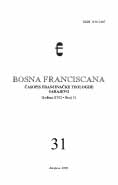Profani teror - Sveta retorika (Kako je bosanski vojvoda Radosav Pavlović posato opaki pataren, bič katoličke vjere)
The Profane Terror - the Holy Rhetotic (How Bosnian Duke Radosav Pavlović Became the Sinister Pataren, the Scourge of the Catholic Religion)
Author(s): Dubravko LovrenovićSubject(s): History
Published by: Franjevačka teologija Sarajevo
Summary/Abstract: The contents of the documents by the Bosnian duke Radosav Pavlović (cir. 1400-1441), a believer in the schismatic Bosnian Church – a ruler by God’s mercy – refers to one Christian doctrine and divine origin for earthly power, meaning a juridical reality with its defined foundations in Biblical texts. In these documents the holy word and the political moral are challenged by the ruling offi ce as the mediator of ruling ideology; as they are, the documents can in no way be connected with the alleged dualism of the Bosnian Church that the Latin literary-theological records impute. Theological questions focused on the clichéd formulas of his charters speak of Christians’ understanding themselves as historically having their very roots in the Old and New Testaments, but also discuss religious truths contained in the Apostles’ Creed, apart from the formulas dealing with expressing loyalty to the Catholic Church: God as creator of heaven and Earth; divine intervention in human history; the transferring of power from father to son (from Pavao Radinović to Radosav Pavlović), divine mediation in the spirit of ideology of a ruler’s autocracy; consciousness of the end of the earthly world; dogma of the Holy Trinity; appealing to the Bible and the cross with which the taking over of moral and legal responsibility is guaranteed; the character of Christ’s pupils – the apostles as the fi rst witnesses of the Christian faith and Apostolic Church; awareness of the meaning of the Ecumenical Council held in Nicaea in 325 along with the mentioning of the 318 bishops who partook in this important event in church history which Emperor Constantine convened and where Arius’s teachings were condemned; respecting holy individuals, who from the very beginning of Christianity bared witness to the faith; the meaning of saving souls; the prominence of Christian holidays, such as Christmas, the Day of St. George, Annunciation, as a systematic part of the religious calendar and events which are enacted once and forever – sketched into eternity; awareness of God’s presence from the beginning to the end of human history; a special place among the saints for the Blessed Virgin Mary; firmly supporting the proper Christian faith as the right faith opposed to the wrong; the idea of apostasy of faith aligned with Judas’s betrayal as a shameful act; consciousness of bodily death and the soul’s immortality, which according to Christian teaching, at the end of time, awaits Judgment Day as a fi nal act preceding the establishment of the Holy Kingdom; the meaning of God’s mercy connected with the right faith; the idea of redeeming human beings from sin through God’s Son and his death on the cross as the supreme sign of God’s love of man; ....
Journal: Bosna Franciscana
- Issue Year: 2009
- Issue No: 31
- Page Range: 129-187
- Page Count: 59
- Language: Bosnian
- Content File-PDF

